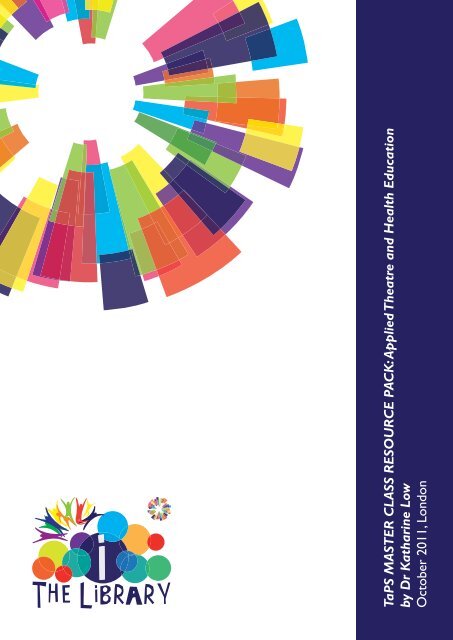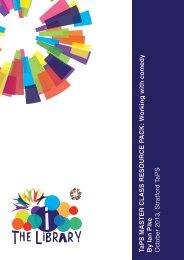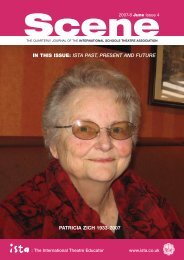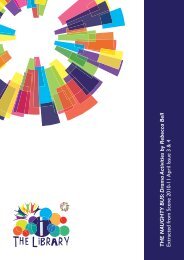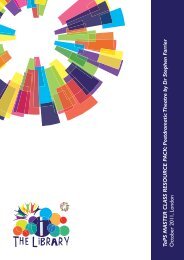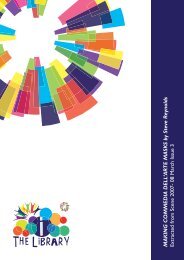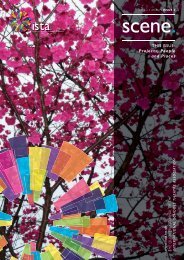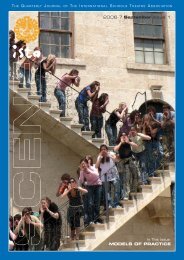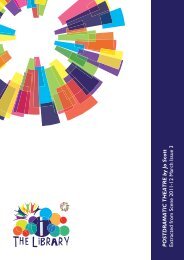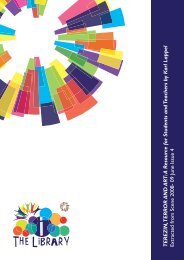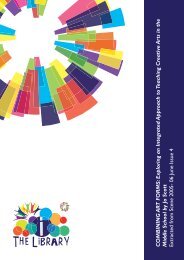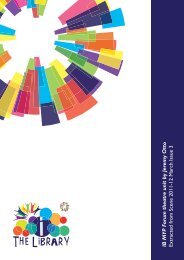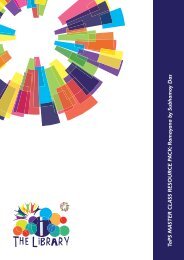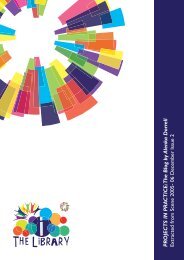Applied Theatre and Health Education by Dr Katharine Low ... - Ista
Applied Theatre and Health Education by Dr Katharine Low ... - Ista
Applied Theatre and Health Education by Dr Katharine Low ... - Ista
You also want an ePaper? Increase the reach of your titles
YUMPU automatically turns print PDFs into web optimized ePapers that Google loves.
TaPS MASTER CLASS RESOURCE PACK: <strong>Applied</strong> <strong>Theatre</strong> <strong>and</strong> <strong>Health</strong> <strong>Education</strong><strong>by</strong> <strong>Dr</strong> <strong>Katharine</strong> <strong>Low</strong>October 2011, London
TaPS Master Class Resource PackMaster Class: <strong>Applied</strong> <strong>Theatre</strong> <strong>and</strong> <strong>Health</strong> <strong>Education</strong> <strong>by</strong> <strong>Dr</strong> <strong>Katharine</strong> <strong>Low</strong><strong>Theatre</strong> <strong>and</strong> the ʻsocialʼ<strong>Theatre</strong> is defined here as any act of performance or representation while theʻsocialʼ refers to the focus of such theatre: the practice engages with or responds tohappenings or events located in the social spaces of peopleʼs lives, for example anisolated illness in a particular community or the global Aids p<strong>and</strong>emic. Such theatre orperformance is not simply utilitarian with limited aesthetics; rather, depending on thecontext, it encompasses a wide range of approaches <strong>and</strong> aims. This type of theatre hasnumerous approaches <strong>and</strong> names, including <strong>Theatre</strong> for Development (TfD), <strong>Theatre</strong> or<strong>Dr</strong>ama in <strong>Education</strong> (TIE or DIE), community theatre, popular theatre, <strong>Theatre</strong> in <strong>Health</strong><strong>Education</strong> (THE), social theatre, <strong>Theatre</strong> for Social Change, Forum <strong>Theatre</strong>, <strong>and</strong> appliedtheatre.<strong>Applied</strong> theatre<strong>Applied</strong> theatre is considered as an ʻorganizing categoryʼ (Thompson 2005:242)under which shelter forms of participatory theatre such as <strong>Theatre</strong> for Development,Community <strong>Theatre</strong>, <strong>Theatre</strong> in <strong>Education</strong>, <strong>and</strong> Peopleʼs <strong>Theatre</strong>. It emerged as a termin the late 1980s alongside a move away from using terms such as ʻcommunity artsʼ orʻcommunity theatreʼ (Giesekam 2006).<strong>Applied</strong> theatre shares its history with other forms of social theatre. BertoltBrechtʼs Lehrstücke, the <strong>Theatre</strong> in <strong>Education</strong> methodologies developed in the 1960s inBritain, Freireʼs ʻPedagogy of the Oppressedʼ <strong>and</strong> Boalʼs ʻ<strong>Theatre</strong> of the Oppressedʼhave all influenced the development of the practice (Prentki & Preston 2009:11–13;Taylor 2003:2–7).As a field, applied theatre is constantly evolving <strong>and</strong> the themes dominating in thepast few years have focused on notions of citizenship, work in conflict zones <strong>and</strong> withrefugees, practice in prisons, <strong>and</strong> disability. However, alongside the ongoing concernsover the effects <strong>and</strong> the outcomes of the practice (Nicholson 2005; Thompson 2009), astronger focus on health <strong>and</strong> health care issues has emerged, spanning a wide range ofcontexts including mental health, HIV prevention, community health <strong>and</strong> differentresearch approaches (White 2009; Brodzinksi 2011).<strong>Applied</strong> theatre practice does not take place in traditional theatre settings, rather itworks in places where many of the usual theatre elements such as lighting <strong>and</strong> soundare not always available. The practice of applied theatre is both process <strong>and</strong> productorientated, with a specific focus on discussion <strong>and</strong> reflection.<strong>Applied</strong> <strong>Theatre</strong> <strong>and</strong> <strong>Health</strong> <strong>Education</strong>© <strong>Katharine</strong> <strong>Low</strong> October 2011, London1
TaPS Master Class Resource Packchildren about sexual health (Frank 1995).Indeed, Esiaba Irobi has suggested that the Aids p<strong>and</strong>emic in Africa has createda ʻ<strong>Theatre</strong> of Necessity. This theatre is about survivalʼ (2006:34). He proposes that thisform of theatre is being used across the African continent with the purpose of educatingpeople through multiple performance forms, including choirs, performance groups, music<strong>and</strong> dance, television <strong>and</strong> radio dramas (37–8).Master class overviewThe workshop will consist of a series of games <strong>and</strong> exercises, which together willhelp to demonstrate how an applied theatre workshop may be constructed to deal withdifferent health-related topics. We will run through the exercises <strong>and</strong> then step back <strong>and</strong>reflect on them in more depth, considering how they might be used in different contexts.Exercises• Brief intro to applied theatre• The elephant <strong>and</strong> the blind menDiscussion- what has this exercise showed us?• Whatʼs the story/complete the imageWays of beginning conversations with groups• Mental health – facts, feelings, ideas <strong>and</strong> objects exerciseWhat stereotypes emerge around mental health <strong>and</strong> mental wellbeing – how doyou begin a conversation about a sensitive subject such as depression?• Line improvIn pairs, a relationship is assigned <strong>and</strong> there is conflict between the two – thepoint is not to find resolution, but to build the conflict. Eventually chose one of thescenarios <strong>and</strong> use forum.• Develop your own workshop/project in response to a health crisisChoosing one of the topics in groups, develop a workshop/project.What are the key things you need to consider? What questions do you need toask yourselves about the ethics of the practice? Give an example of the kind ofpractice you would do._______________________________________________________<strong>Applied</strong> <strong>Theatre</strong> <strong>and</strong> <strong>Health</strong> <strong>Education</strong>© <strong>Katharine</strong> <strong>Low</strong> October 2011, London3
TaPS Master Class Resource PackBibliographyAbah, O. S (2005) Performing Life: Case Studies in the Practice of <strong>Theatre</strong> forDevelopment. Nigeria: Tamaza Publishing Co.Ackroyd, J (2007) <strong>Applied</strong> <strong>Theatre</strong>: An Exclusionary Discourse? <strong>Applied</strong> <strong>Theatre</strong>Researcher/IDEA Journal [Online] 8. From:http://www.griffith.edu.au/__data/assets/pdf_file/0005/52889/01-ackroyd- final.pdfBoal, A (2000) <strong>Theatre</strong> of the Oppressed. London: Pluto PressBoal, A (2002) Games for Actions <strong>and</strong> Non-Actors. (2nd ed.), Trans. Jackson, A.London; New York: RoutledgeBoon, R. & Plastow, J. (eds.) (2004) <strong>Theatre</strong> <strong>and</strong> Empowerment: Community <strong>Dr</strong>ama onthe World Stage. Cambridge: Cambridge University Press.Bourgault, L. M (2003) Playing for Life: Performance in Africa in the Age of AIDS.Durham, North Carolina: Carolina Academic PressBrodzinski, E (forthcoming). <strong>Theatre</strong> in <strong>Health</strong> Care. Basingstoke: Palgrave MacmillanConquergood, Dwight (1988) <strong>Health</strong> <strong>Theatre</strong> in a Hmong Refugee Camp: Performance,Communication, <strong>and</strong> Culture. TDR, 32 (3), pp. 174-208Epskamp, K. P (1989) <strong>Theatre</strong> in Search of Social Change: The relative significance ofdifferent theatrical approaches. Trans. Hooymans, G. The Hague: Centre for theStudy of <strong>Education</strong> in Developing Countries (CESO)Fischer-Lichte, Erika (2008) The Transformative Power of Performance: A NewAesthetics. Trans. Saskya Iris Jain. London: RoutledgeFrank, M (1995) AIDS education through theatre: case studies from Ug<strong>and</strong>a. BayreuthAfrican Studies 35. Bayreuth: Eckhard BreitingerGiesekam, G (2006) <strong>Applied</strong> <strong>Theatre</strong>/<strong>Dr</strong>ama: an e-debate in 2004. Research in <strong>Dr</strong>ama<strong>Education</strong>: The Journal of <strong>Applied</strong> <strong>Theatre</strong> <strong>and</strong> Performance, 11 (1), pp. 90-95Irobi, Esiaba (2006) African Youth, Performance <strong>and</strong> the HIV/AIDS Epidemic: <strong>Theatre</strong> ofNecessity. In: Michael Etherton (ed.). African <strong>Theatre</strong>: Youth. Oxford: JamesCurrey, pp. 31-41Jackson, A (2007) <strong>Theatre</strong>, education <strong>and</strong> the making of meanings: Art or instrument?Manchester: Manchester University PressKerr, D (1995) African Popular <strong>Theatre</strong>: From Pre-colonial Times to the Present Day.Studies in African Literature. London: James Currey<strong>Low</strong>, <strong>Katharine</strong> E (2010) ʻCreating a space for the individual: different theatre <strong>and</strong>performance-based approaches to sexual health communication in South Africa.ʼJournal of <strong>Applied</strong> Arts <strong>and</strong> <strong>Health</strong>. 1 (1), pp. 111-126Mlama, P. M (1991) Culture <strong>and</strong> Development: The Popular <strong>Theatre</strong> Approach in Africa.Uppsala: Nordiska Afrikainstitutet (The Sc<strong>and</strong>inavian Institute of African Studies)<strong>Applied</strong> <strong>Theatre</strong> <strong>and</strong> <strong>Health</strong> <strong>Education</strong>© <strong>Katharine</strong> <strong>Low</strong> October 2011, London4
TaPS Master Class Resource PackNicholson, H (2005a) <strong>Applied</strong> <strong>Dr</strong>ama: The Gift of <strong>Theatre</strong>. Basingstoke: PalgraveMacmillanPrentki, T. & Preston, S (eds.) (2009) The <strong>Applied</strong> <strong>Theatre</strong> Reader. London; New York:RoutledgeRiccio, Thomas (2004). Kenyaʼs Community <strong>Health</strong> Awareness Puppeteers. PerformingArts Journal, 76, pp. 1-12Rohd, Michael (1998) <strong>Theatre</strong> for Community, Conflict <strong>and</strong> Dialogue: The Hope Is VitalTraining Manual. Greenwood PressSinghal, A., <strong>and</strong> Rogers, E.M (1999) Entertainment-<strong>Education</strong>: A CommunicationStrategy for Social Change. Mahwah, New Jersey: LEA Lawrence ErlbaumAssociates, PublishersTaylor, P (2003) <strong>Applied</strong> <strong>Theatre</strong>: Creating Transformative Encounters in theCommunity. Portsmouth, NH: HeinemannThompson, J (2006) <strong>Applied</strong> <strong>Theatre</strong>: Bewilderment <strong>and</strong> Beyond. Bern: Pater Lang.Thompson, J (2009) Performance Affects: <strong>Applied</strong> <strong>Theatre</strong> <strong>and</strong> the End of Effect.Basingstoke: Palgrave Macmillian__________________________________________________________Practitionerʼs pathwayMy first encounter with applied theatre, or theatre for a social purpose, was duringmy IB years at La Chataigneraie in Geneva, where we were partnered with a local SwissSEN primary school for a few months.Every week, six of us from La Chat, <strong>and</strong> twelve students from the school wouldmeet <strong>and</strong> play games <strong>and</strong> encounter different imaginary worlds. Part of the interest <strong>and</strong>excitement for me was finding ways of creating workshops that would interest <strong>and</strong>engage the children <strong>and</strong> provide spaces for them to imagine, create <strong>and</strong> have fun. Sincethen, I have been heavily involved in applied theatre work, particularly in the field ofhealth care <strong>and</strong> sexual <strong>and</strong> reproductive health communication.During my undergraduate degree at the University of Glasgow, I ran an AidsAwareness project in the Limpopo province in South Africa with a local school. I thenworked for a number of <strong>Theatre</strong> in <strong>Education</strong> projects in Glasgow before beginning myMasters in <strong>Applied</strong> <strong>Theatre</strong> at the University of Manchester. During my time atManchester, I worked with a local HIV/Aids charity running workshops <strong>and</strong> exploredyouth-led responses to HIV/Aids in Tanzania. I then began my PhD in <strong>Applied</strong> <strong>Theatre</strong>,exploring its role in developing appropriate responses to different sexual health concerns<strong>and</strong> considering how it may play a role in developing new communication pathways<strong>Applied</strong> <strong>Theatre</strong> <strong>and</strong> <strong>Health</strong> <strong>Education</strong>© <strong>Katharine</strong> <strong>Low</strong> October 2011, London5
TaPS Master Class Resource Packaround sensitive sexual health topics, such as rape or sexuality. My practice took placein Dar es Salaam in Tanzania <strong>and</strong> the Nyanga township in Cape Town, South Africa.I now lecture in <strong>Applied</strong> <strong>Theatre</strong> at the Central School of Speech <strong>and</strong> <strong>Dr</strong>ama <strong>and</strong>at Goldsmiths College._________________________________________________<strong>Applied</strong> <strong>Theatre</strong> <strong>and</strong> <strong>Health</strong> <strong>Education</strong>© <strong>Katharine</strong> <strong>Low</strong> October 2011, London6


